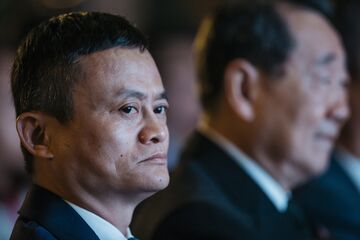Jack Ma Bets $2.6 Billion He Can Revamp China Retail Sector
Source: Anthony Kwan

Alibaba Group Holding Ltd. pioneered shopping on the internet in China. Now it thinks it can teach old-school retailers a thing or two about real-world commerce.
The online juggernaut that vanquished EBay and Amazon in China has set its sights on transforming the byzantine world of brick-and-mortar retail. In its biggest old-economy deal so far, Alibaba is leading a bid to buy out department store chain Intime Retail Group Co. for as much as $2.6 billion. That’s a premium for the privilege of owning a company with shrinking revenues and a minuscule footprint beyond its eastern home region.
But by teaming up with retailers, billionaire founder Jack Ma hopes to develop a new model of online and offline retail. The idea is that Alibaba’s superior computing power, a decade of experience moving billions of dollars of goods and strong ties with government and big brands will help it succeed where others like Wal-Mart Stores Inc. and even Amazon.com Inc. have failed. If it works, the tie-up may open the door to still more, helping Alibaba both extend its logistics network and gain invaluable consumer data.
“No one has any solution or concrete answer, although everyone knows that this is the next page of the industry. Alibaba wants to be the one to develop the solution,” said Anson Chan, a Hong-Kong based Daiwa Capital Markets analyst.
History has shown that online and offline businesses don’t play well together. Wal-Mart spent billions of dollars on growing its e-commerce operation at the expense of profits, yet Amazon still holds sway in the U.S. Amazon itself is now venturing into brick-and-mortar stores though that effort is still nascent.
Alibaba however is dealing with a very different market, and is driven by a need to secure new sources of growth as e-commerce plateaus. Ma himself has confessed he sees “tremendous challenges” for one-dimensional e-commerce operators as the country’s economy slows. His goal is to try and up-end a splintered and bloated $4.5 trillion Chinese retail landscape, stripping out middlemen to reduce costs and improve efficiency. Apart from Intime, Alibaba has also bought into electronics players Suning Commerce Group Co. and Haier Electronics Group. Alibaba shares rose 2.1 percent in U.S. trading after the deal was announced, while Intime’s stock surged 36 percent in Hong Kong.
Chinese retailers could use some help. They’ve struggled in past years to retain consumers frustrated with lackluster, poorly managed malls. Unlike in the U.S., which is controlled by a clutch of mega-chains, the Chinese retail experience is far more fragmented and inconsistent. Intime, one of the better-known players, operated and managed just 29 department stores and 17 shopping malls across the country as of end-June last year, mainly in eastern Zhejiang province. That’s a far cry from the U.S., where nationwide chains such as Wal-Mart and Macy’s Inc. dominate specific strata.
More important than geographical reach however is simple store management. While Wal-Mart and Amazon’s logistical machines inspire college case studies, most Chinese retailers still operate in separate, walled-off regions. Management lacks incentive to innovate.
Alibaba sees an opportunity in helping such retailers use technology to transform inventory management, while securing a physical network through which it can get goods to its own customers more efficiently, for instance by letting customers pick up orders from stores.
“Physical retail in China is backwards compared to elsewhere,” said Catherine Lim, an analyst with Bloomberg Intelligence in Singapore. “It’s going to be a root-and-branch effort to get the offline side up to standard, and that’s probably why Alibaba felt the need to take it over totally.”
Lim cites a familiar example: You have to wait days to find out if there’s a size 10 dress in another branch of the same store.
“The players have started to modernize, but it’s been very slow. The truth is that the technology and software is there, it’s whether the people were willing to adapt to it.”
The logic of the Intime deal isn’t apparent to all. Alibaba may be counting on success in reviving the mall operator to encourage other retailers to adopt its online-to-offline or O2O model, Chan said.
“What’s possible is that Alibaba wants to develop the O2O model and system through this partnership and, once it’s perfected, open up that system for others to use as a platform, like its cloud business,” Chan said.
Also, neither Alibaba nor Intime own a lot of the inventory they sell -- Intime operates much like a bazaar where different brands run concessions. That means brands will need to be won over.
“There is still the missing piece of the people who actually sell the items,” said Chan Wai-Chan, a Hong-Kong based senior partner at Oliver Wyman’s Asia Pacific consumer practice. “Intime is only in Zhejiang, so there won’t be a national reach. Maybe in the grand plan, Alibaba will buy other department stores, since sales of department stores have fallen through the floor.”
But Alibaba’s certainly giving it a go. It’s already building a network that will allow physical stores -- and the brands they sell -- to monitor transactions as they happen.
Like Amazon, Alibaba also owns a sprawling collection of online assets, from its budding cloud computing business to mobile search and video entertainment, that could conceivably by combined with physical retail. Shoppers might spot a dress they like on Youku Tudou, run a search via Alibaba’s photo-recognition technology and find 10 similar garments online. Its logistics affiliate, Cainiao, can help retailers identify vacant warehouses and available inventory and match goods with the company’s 450 million active buyers more efficiently.
“What Alibaba might want to do is to crunch its marketing, logistics, cloud computing and search and entertainment services all into a package for brands to create value, something they won’t be able to do themselves,” said Julia Pan, a Shanghai-based analyst at UOB Kay Hian.
| }
|